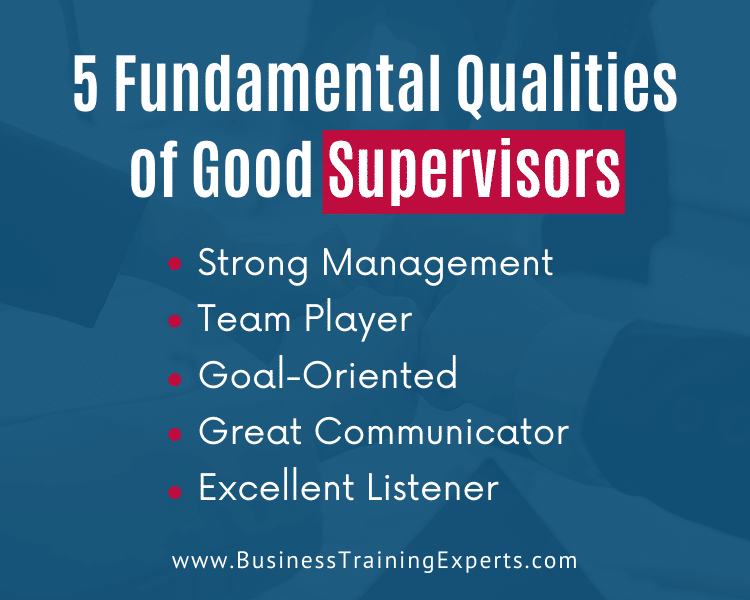
It’s long been said that the greatest impact on an employee’s decision to stay with or leave, an organization is dependent on who they report to. Good supervisor qualities are a “must-have” for any organization.
Unfortunately, all too often organizations promote employees who have been strong individual contributors without thoroughly assessing whether they have good supervisor qualities—or providing them with training to close critical gaps.
Supervisors are responsible for getting the day-to-day tasks done through others. They monitor and manage the daily activities of their team.
Solid supervisors can lay a foundation for trust, commitment, engagement, and productivity. On the flip side, though, there also are some important signs of an ineffective leader to be alert to.
When supervisors are ineffective they can seriously damage employee engagement and productivity, leading to real bottom-line impacts that can threaten an organization’s success.
An effective supervisor training program can lay the foundation for developing current, future, and potential leaders.
What is a Supervisor
A supervisor is an individual who has been identified as someone who will lead the efforts of a group of employees. The employees in that group are on the front lines. Supervisors are one step above.
A supervisor’s primary responsibility is to ensure that the work gets done efficiently and effectively.
What Makes a Good Supervisor?
Being a good supervisor means having the ability to motivate others to effective task completion. Good supervisors must have strong communication skills and the ability to form positive relationships with others.
There are some key qualities that you should look for in those who you identify as supervisory leaders for your organizations. Here we take a look at five critical qualities that effective supervisors must-have.
Strong Management
Effective supervisors must have strong management skills. Their work involves encouraging their employees to achieve their goals efficiently and effectively. That involves process management and a focus on the productivity of the team overall. Efficiency is critical. The more efficient employees are, the more profitable the organization is.
Team Player
Effective supervisors must also be team players. They will work not only with their employees but with other departments. As they delegate tasks and motivate their own employees they will also coordinate work efforts with other supervisors.
Competition and conflict emerge when supervisors don’t understand how their teams’ efforts affect other work teams. Departments in any organization are interdependent.
Solid team players are able to work with others to achieve mutual goals.
Goal-Oriented
Success in any organization is measured through the achievement of goals. Goal-oriented supervisors have a clear understanding of the outcomes they, and their teams, need to achieve. Their mindset is centered around achieving goals and driving organizational results as they focus on specific objectives.
Great Communicator
Communication is critical in any supervisory position. Good verbal and written communication skills are required to interact effectively with others, to provide clear direction, and to give focused feedback that may be both positive and constructive.
Supervisors must speak with impact and clarity to motivate employees to work efficiently and effectively. Ineffective departments are often a sign of poor leadership.
Excellent Listener
Finally, good supervisors must be good listeners. While their job involves giving others direction, they need to be adept at drawing out others and listening carefully to their input so they can remove barriers and establish an environment that furthers organizational goals and leads to success.
Supervisors play a role of resolving conflicts by listening carefully to different perspectives of employees. That listening involves empathy and the ability to truly understand the needs of coworkers and others.
There are a number of qualities that supervisors must have to be effective in their jobs. Here we’ve covered what we believe to be the top five.
Are your supervisors exhibiting these qualities? Are there gaps that need to be addressed?
Taking the steps to ensure that supervisors are well prepared with the knowledge, information, and experiences to perform effectively can benefit your entire organization.

